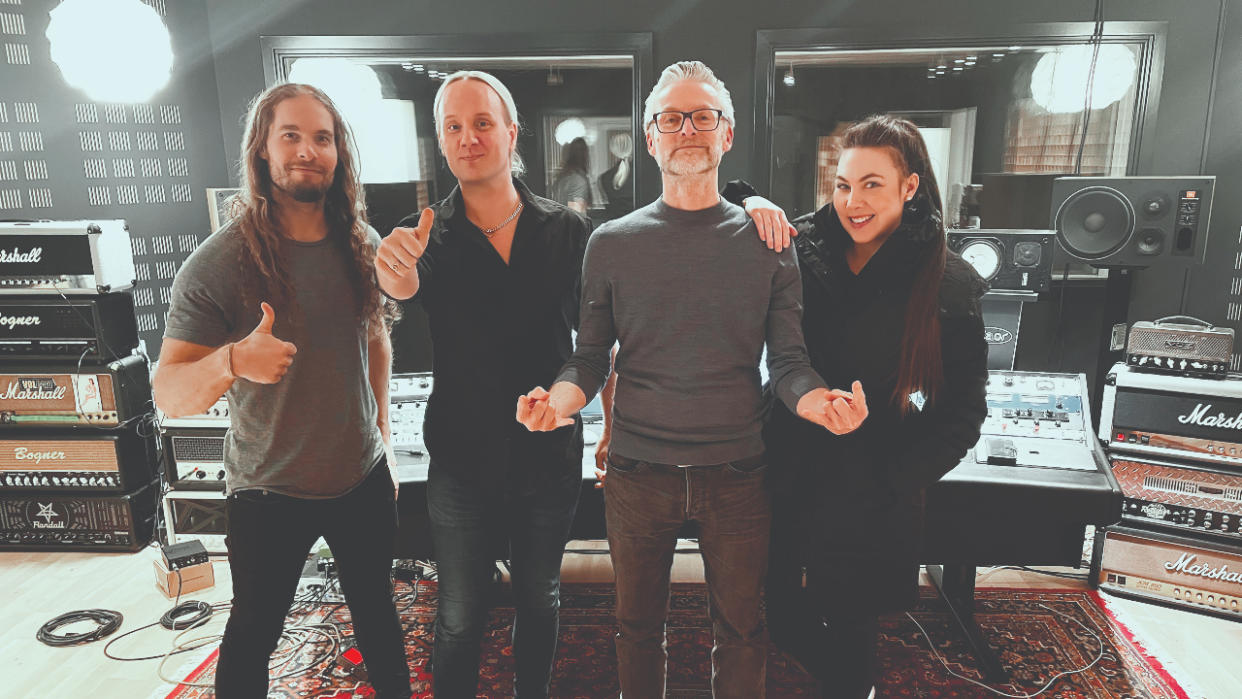"It’s everything from super-organic to super-symphonic, to super-poppy, to super-harsh." We get in the studio with Amaranthe to find out why the Swedish pop-metallers have gone "a little bit crazy" for new album The Catalyst

Swedish pop-metallers Amaranthe have spent the last 15 years smashing genres together. Now, on their seventh album, they’re continuing to take their vivid blend of power metal, sparkling Eurovision-esque pop and thunderous EDM to the extreme. As singer Elize Ryd tells us, upcoming album The Catalyst will be their biggest, most diverse album yet.
You’ve announced The Catalyst is coming in February 2024. Where are you at with recording it?
“It’s actually already finished, 100%.”
So now you have to sit on it for another few months?
“I know, right? We thought we’d have more time to finish the mixing process because that’s usually what takes time, but our label, Nuclear Blast, wanted to have it available for pre-order already. We skipped our vacation just to make sure that we were happy with the final mix. I spent July going through all the songs, listening carefully to all the small details with the special effects on the voice and delays and reverbs. It’s a very big part of how Amaranthe sounds.”
What does producer Jacob Hansen bring to the table?
“He’s produced all of our records. He’s very easy to work with. He’s very open-minded. I just know if we were to choose another producer, this person would get a little bit too involved and maybe want to change things. Jacob really gets the importance of keeping the Amaranthe sound.”
What does the new record sound like?
“It sounds very much like Amaranthe! It’s futuristic, very diverse. It’s everything from super-organic to super-symphonic, to super-poppy, to super-harsh. It is massive and that was the goal, to make it even bigger than [the last album, 2020’s] Manifest. So we thought, ‘OK, now we can go a little bit more crazy on this one.’”
Amaranthe are often lumped in with symphonic metal, but you’ve never really explored that sound before. Have you leaned into that here?
“Only on two tracks. One of them [first single Damnation Flame] has been released. I did some guest vocals with Nightwish [in 2012], and they were one of my favourite bands before I started Amaranthe. That’s not what Amaranthe is known for, but we wanted to salute that part of the metal scene.”
Damnation Flame isn’t representative of the rest of the album, then?
“The next single is going to be totally different, the opposite of Damnation Flame! Very much like old-school Amaranthe, and then the single after that is going
to represent something else. We’ve always been extremely diverse. Then
the remaining six or seven tracks on the album are going to be a big surprise.”
What does the album title, The Catalyst, mean to you?
“It means focusing on the right things in life: the things that makes you happy, the things that inspire you, the things that can take you to the next level. I had a lot of fears in the past. I was very fragile regarding things in society. You can you feel hopeless sometimes. You can’t control everything that is going on, but you can control the things closest to you. One thing can be the catalyst to throw you into complete darkness, but you can also find what is the catalyst for harmony and joy, despite what is going on in the real world.”
What subjects are you discussing on the album?
“We are travelling through time and space! We imagine being alive during the times when there were vampires and women were accused of being witches. [There are songs about] being a woman in 2023, and also being a woman or a man in the future. We’ve always had an undertone of important messages, but they’re created from the human, the natural, the emotions we’re feeling. Also, certain songs are lighter, because that’s also what I feel we need, to get a little bit uplifted sometimes!"
The Catalyst is out February 24 via Nuclear Blast. This interview was originally printed in Metal Hammer #381

